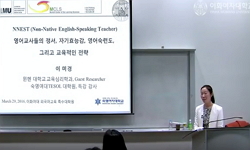The purpose of this study is to verify the effect of learning satisfaction of cyber university's beauty major graduates on job performance, and the effects of self-efficacy and job satisfaction that mediate this, to improve job competency through lear...
http://chineseinput.net/에서 pinyin(병음)방식으로 중국어를 변환할 수 있습니다.
변환된 중국어를 복사하여 사용하시면 됩니다.
- 中文 을 입력하시려면 zhongwen을 입력하시고 space를누르시면됩니다.
- 北京 을 입력하시려면 beijing을 입력하시고 space를 누르시면 됩니다.
사이버대학교 졸업생의 학습만족도가 직무성과에 미치는 영향에 대한 연구 : K 사이버대학 뷰티학과를 중심으로 = A Study of the Influence on Job Performance based on Learning Satisfaction of Cyber University Graduates : A case study of beauty majored graduates from K Cyber University
한글로보기https://www.riss.kr/link?id=T15833576
- 저자
-
발행사항
논산 : 건양대학교, 2021
-
학위논문사항
학위논문(박사) -- 건양대학교 , 보건학과 의료뷰티학 , 2021. 2
-
발행연도
2021
-
작성언어
한국어
-
주제어
학습만족도 ; 직무성과 ; 자기효능감 ; 직무만족도 ; 직무몰입 ; 사이버대학교 ; 성인학습자 ; 뷰티산업 ; Academic Satisfaction ; Job Performance ; Self-efficacy ; Job Satisfaction ; Job Committment ; Cyber University ; Adult Learner ; Beauty Industry
-
발행국(도시)
충청남도
-
형태사항
97 ; 26 cm
-
일반주기명
지도교수: 노영희
-
UCI식별코드
I804:44001-200000383364
- 소장기관
-
0
상세조회 -
0
다운로드
부가정보
다국어 초록 (Multilingual Abstract)
To conduct the research, a research model was developed by referring to previous studies. A total of 137 copies were used for analysis by selecting a beauty major graduate of K Cyber University located in Daejeon and Chungcheong area and conducting a self-report questionnaire. The collected data were analyzed using the SPSS 23.0 statistical program, and the Crombach a coefficient was checked to verify the internal reliability of the measurement question, and the basis for the mean, standard deviation, and mean to confirm
the characteristics of respondents and the level of major variables, Statistics were conducted, and t-test, analysis of variance, and post-test were conducted to find out the difference between the major variables according to the respondents' characteristics. In addition, to confirm the correlation between learning satisfaction, self-efficacy, and job performance, an analysis was performed using the correlation coefficient, and a regression analysis was performed to verify the mediating effect between learning satisfaction and job performance.
The results obtained through this study are as follows. First, there were significant correlations in learning satisfaction, self-efficacy, job satisfaction, and job performance among the graduates of the Department of Beauty at K Cyber University.
Second, as a result of analyzing the mediating effect of self-efficacy in the relationship between learning satisfaction and job performance, it was found that there is a mediating effect not only in self-efficacy, but also in performance achievement and personal factors, which are sub-variables of self-efficacy. Students with high self-efficacy are expected to actively act to achieve their goals, make more effort than those with low self-efficacy, and continue to work even if they have difficulties.
Third, analyzing the mediating effect of job satisfaction in the relationship between learning satisfaction and job performance, not only job satisfaction but also job characteristics, a sub-factor of job satisfaction, had a positive mediating effect.
Fourth, the relationship between learning satisfaction and job performance had a parallel mediating effect of self-efficacy and job satisfaction, and it was found that there was a significant effect among all variables. As a result of the study, it was found that the learning satisfaction of K Cyber University's beauty department graduates has an important influence on job performance, and variables such as self-efficacy and job satisfaction act as important parameters. It is suggested that the learning satisfaction of beauty majoring graduates improves job performance, and self-efficacy and job satisfaction act as an important facilitating factor in enhancing job performance in the field. Therefore, it is not only necessary to improve job satisfaction by continuously providing training courses based on practical competency to target subjects, but also to develop and operate various programs that can maximize job-related self-efficacy tailored to adult learners as well as technology-oriented education. Through measures to increase students' learning satisfaction, it is necessary to seek ways to improve job satisfaction and job performance.
Although it was intended to help the cyber university’s graduates in hair and beauty industry find positive ways for their job performance, there was a limit to generalizing the research results to the results of beauty-related graduates of all cyber universities in Korea. In future research, the need for continuous and long-term empirical analysis and in-depth research is required for cyber university graduates to improve their job performance by conducting in-depth interviews and observations of experts with various cyber universities as research subjects.
The purpose of this study is to verify the effect of learning satisfaction of cyber university's beauty major graduates on job performance, and the effects of self-efficacy and job satisfaction that mediate this, to improve job competency through learning satisfaction of beauty majors and work accordingly. It was intended to provide basic data for activation of performance.
To conduct the research, a research model was developed by referring to previous studies. A total of 137 copies were used for analysis by selecting a beauty major graduate of K Cyber University located in Daejeon and Chungcheong area and conducting a self-report questionnaire. The collected data were analyzed using the SPSS 23.0 statistical program, and the Crombach a coefficient was checked to verify the internal reliability of the measurement question, and the basis for the mean, standard deviation, and mean to confirm
the characteristics of respondents and the level of major variables, Statistics were conducted, and t-test, analysis of variance, and post-test were conducted to find out the difference between the major variables according to the respondents' characteristics. In addition, to confirm the correlation between learning satisfaction, self-efficacy, and job performance, an analysis was performed using the correlation coefficient, and a regression analysis was performed to verify the mediating effect between learning satisfaction and job performance.
The results obtained through this study are as follows. First, there were significant correlations in learning satisfaction, self-efficacy, job satisfaction, and job performance among the graduates of the Department of Beauty at K Cyber University.
Second, as a result of analyzing the mediating effect of self-efficacy in the relationship between learning satisfaction and job performance, it was found that there is a mediating effect not only in self-efficacy, but also in performance achievement and personal factors, which are sub-variables of self-efficacy. Students with high self-efficacy are expected to actively act to achieve their goals, make more effort than those with low self-efficacy, and continue to work even if they have difficulties.
Third, analyzing the mediating effect of job satisfaction in the relationship between learning satisfaction and job performance, not only job satisfaction but also job characteristics, a sub-factor of job satisfaction, had a positive mediating effect.
Fourth, the relationship between learning satisfaction and job performance had a parallel mediating effect of self-efficacy and job satisfaction, and it was found that there was a significant effect among all variables. As a result of the study, it was found that the learning satisfaction of K Cyber University's beauty department graduates has an important influence on job performance, and variables such as self-efficacy and job satisfaction act as important parameters. It is suggested that the learning satisfaction of beauty majoring graduates improves job performance, and self-efficacy and job satisfaction act as an important facilitating factor in enhancing job performance in the field. Therefore, it is not only necessary to improve job satisfaction by continuously providing training courses based on practical competency to target subjects, but also to develop and operate various programs that can maximize job-related self-efficacy tailored to adult learners as well as technology-oriented education. Through measures to increase students' learning satisfaction, it is necessary to seek ways to improve job satisfaction and job performance.
Although it was intended to help the cyber university’s graduates in hair and beauty industry find positive ways for their job performance, there was a limit to generalizing the research results to the results of beauty-related graduates of all cyber universities in Korea. In future research, the need for continuous and long-term empirical analysis and in-depth research is required for cyber university graduates to improve their job performance by conducting in-depth interviews and observations of experts with various cyber universities as research subjects.
국문 초록 (Abstract)
연구를 위하여 선행연구를 참고하여 연구모형을 개발하였다. 대전․충청권에 위치하고 있는 K 사이버대학교의 뷰티 전공 졸업생을 선정하여 자기보고식 설문을 실시하여 총 137부를 분석에 활용하였다. 수집된 자료는 SPSS 23.0 통계 프로그램을 이용하여 분석하였고, 측정문항의 내적 신뢰성을 검증하기 위해 Crombach a 계수를 확인하였으며, 응답자특성과 주요 변인들의 수준을 확인하기 위해 평균, 표준편차, 평균에 대한 기초 통계를 실시하였으며, 응답자의 특성에 따른 주요 변인들의 차이를 알아보기 위해 t검정과 분산분석 및 사후검정을 실시하였다. 또한 학습 만족도, 자기효능감, 직무성과 간의 상관관계를 확인하기 위하여 상관계수를 활용하여 분석을 실시하고 학습 만족도와 직무성과의 매개 효과를 검증하기 위해 회귀분석을 실시하였다.
본 연구를 통하여 얻은 결과는 다음과 같다.
첫째, K 사이버대학교 뷰티 전공 졸업생들의 학습만족도, 자기효능감, 직무만족, 직무성과 모든 변인에서 유의미한 상관관계를 보였다.
둘째, 학습만족도와 직무성과 간의 관계에서 자기효능감의 매개 효과를 분석한 결과 자기효능감 뿐만 아니라 자기효능감의 하위변인인 수행성취와 개인적 요인에서도 매개 효과가 있는 것으로 나타났다. 자기효능감이 높은 사람은 목표성취를 위해 적극적으로 행동하며 자기효능감이 낮은 사람에 비해 더 많은 노력을 하고, 어려움이 있더라도 과업을 지속적으로 할 것으로 예측된다.
셋째, 학습만족도와 직무성과 간의 관계에서 직무만족의 매개 효과를 분석한 결과 직무만족 뿐만 아니라 직무만족의 하위요인인 직무특성도 매개 효과가 있었다.
넷째, 학습만족도와 직무성과와의 관계는 자기효능감과 직무만족의 병렬 매개 효과가 있었고 모든 변인들 간 유의미한 영향이 있음을 알 수 있었다.
이상의 연구 결과로 K 사이버대학교 뷰티 전공 졸업생들의 학습만족도는 직무성과에 중요한 영향을 미치며 자기효능감, 직무만족 등의 변인들이 중요한 매개 변수로 작용하고 있음을 알 수 있었다. 뷰티 전공 졸업생들의 학습만족도가 직무성과를 높이고, 자기효능감이나 직무만족이 현장에서의 직무성과를 높이는데 중요한 촉진 요인으로 작용함을 시사해주고 있다. 따라서 대상자들에게 실무역량 기반의 교육과정을 지속적으로 제공하여 직무 만족을 향상 시킬 뿐만 아니라, 성인학습자 맞춤형으로 직무관련 자기효능감을 극대화 할 수 있는 다양한 프로그램의 개발및 운영이 요구된다. 또한 학생들의 학습만족도를 높이는 방안을 통하여 직무만족과 직무성과를 높일 수 있는 방안을 함께 모색해야만 한다.
본 연구는 뷰티 전공 졸업생들의 직무성과를 위한 긍정적인 방안 모색에 도움이 되고자 하였으나 연구 결과 모든 사이버대학의 뷰티 관련 졸업생의 결과로 일반화시키기에는 한계가 있었다. 향후 연구에서는 연구 대상을 지역별, 학교별, 전공별로 다양하게 접근하며, 전문가의 심층 인터뷰 및 관찰 등의 다양한 조사 방법을 병행하는 장기적이고 실증적인 심화 연구의 필요성이 요구된다.
본 연구의 목적은 사이버대학교의 뷰티 전공 졸업생들의 학습만족도가 직무성과에 미치는 영향과 이를 매개하는 자기효능감, 직무만족도의 효과를 검증하여 뷰티 전공 졸업생들의 학습만...
본 연구의 목적은 사이버대학교의 뷰티 전공 졸업생들의 학습만족도가 직무성과에 미치는 영향과 이를 매개하는 자기효능감, 직무만족도의 효과를 검증하여 뷰티 전공 졸업생들의 학습만족을 통한 직무능력 향상과 이에 따른 직무성과의 활성화를 위한 기초자료를 제공하고자 하였다.
연구를 위하여 선행연구를 참고하여 연구모형을 개발하였다. 대전․충청권에 위치하고 있는 K 사이버대학교의 뷰티 전공 졸업생을 선정하여 자기보고식 설문을 실시하여 총 137부를 분석에 활용하였다. 수집된 자료는 SPSS 23.0 통계 프로그램을 이용하여 분석하였고, 측정문항의 내적 신뢰성을 검증하기 위해 Crombach a 계수를 확인하였으며, 응답자특성과 주요 변인들의 수준을 확인하기 위해 평균, 표준편차, 평균에 대한 기초 통계를 실시하였으며, 응답자의 특성에 따른 주요 변인들의 차이를 알아보기 위해 t검정과 분산분석 및 사후검정을 실시하였다. 또한 학습 만족도, 자기효능감, 직무성과 간의 상관관계를 확인하기 위하여 상관계수를 활용하여 분석을 실시하고 학습 만족도와 직무성과의 매개 효과를 검증하기 위해 회귀분석을 실시하였다.
본 연구를 통하여 얻은 결과는 다음과 같다.
첫째, K 사이버대학교 뷰티 전공 졸업생들의 학습만족도, 자기효능감, 직무만족, 직무성과 모든 변인에서 유의미한 상관관계를 보였다.
둘째, 학습만족도와 직무성과 간의 관계에서 자기효능감의 매개 효과를 분석한 결과 자기효능감 뿐만 아니라 자기효능감의 하위변인인 수행성취와 개인적 요인에서도 매개 효과가 있는 것으로 나타났다. 자기효능감이 높은 사람은 목표성취를 위해 적극적으로 행동하며 자기효능감이 낮은 사람에 비해 더 많은 노력을 하고, 어려움이 있더라도 과업을 지속적으로 할 것으로 예측된다.
셋째, 학습만족도와 직무성과 간의 관계에서 직무만족의 매개 효과를 분석한 결과 직무만족 뿐만 아니라 직무만족의 하위요인인 직무특성도 매개 효과가 있었다.
넷째, 학습만족도와 직무성과와의 관계는 자기효능감과 직무만족의 병렬 매개 효과가 있었고 모든 변인들 간 유의미한 영향이 있음을 알 수 있었다.
이상의 연구 결과로 K 사이버대학교 뷰티 전공 졸업생들의 학습만족도는 직무성과에 중요한 영향을 미치며 자기효능감, 직무만족 등의 변인들이 중요한 매개 변수로 작용하고 있음을 알 수 있었다. 뷰티 전공 졸업생들의 학습만족도가 직무성과를 높이고, 자기효능감이나 직무만족이 현장에서의 직무성과를 높이는데 중요한 촉진 요인으로 작용함을 시사해주고 있다. 따라서 대상자들에게 실무역량 기반의 교육과정을 지속적으로 제공하여 직무 만족을 향상 시킬 뿐만 아니라, 성인학습자 맞춤형으로 직무관련 자기효능감을 극대화 할 수 있는 다양한 프로그램의 개발및 운영이 요구된다. 또한 학생들의 학습만족도를 높이는 방안을 통하여 직무만족과 직무성과를 높일 수 있는 방안을 함께 모색해야만 한다.
본 연구는 뷰티 전공 졸업생들의 직무성과를 위한 긍정적인 방안 모색에 도움이 되고자 하였으나 연구 결과 모든 사이버대학의 뷰티 관련 졸업생의 결과로 일반화시키기에는 한계가 있었다. 향후 연구에서는 연구 대상을 지역별, 학교별, 전공별로 다양하게 접근하며, 전문가의 심층 인터뷰 및 관찰 등의 다양한 조사 방법을 병행하는 장기적이고 실증적인 심화 연구의 필요성이 요구된다.
목차 (Table of Contents)
- 제1장 서론 1
- 제1절 연구배경 및 필요성 1
- 제2절 연구문제 및 가설 5
- 제2장 이론적 배경 7
- 제1절 사이버대학교 7
- 제1장 서론 1
- 제1절 연구배경 및 필요성 1
- 제2절 연구문제 및 가설 5
- 제2장 이론적 배경 7
- 제1절 사이버대학교 7
- 1. 사이버대학교 7
- 2. 사이버대학의 학습지원 12
- 3. 사이버대학의 교수학습 활동 13
- 4. 사이버대학교 뷰티학과 14
- 4-1. 뷰티학과 개설현황 14
- 4-2. 뷰티학과 교육목표 15
- 제2절 학습만족도 17
- 제3절 자기효능감 23
- 제4절 직무만족도 26
- 제5절 직무성과 29
- 제3장 연구방법 33
- 제1절 연구대상 및 기간 33
- 제2절 측정도구 34
- 1. 신뢰성 분석 34
- 2. 타당성 분석 35
- 제3절 설문지 구성 38
- 제4절 자료 분석 방법 40
- 제4장 연구 분석 결과 41
- 제1절 인구학적 통계 결과 41
- 제2절 학습만족도가 직무성과에 미치는 영향 결과 44
- 1. 학습만족도, 자기효능감, 직무만족도 직무성과의 평균 및 표준편차 44
- 2. 학습만족도, 직무만족도, 자기효능감, 직무성과의 상관관계 결과 45
- 3. 학습만족도와 직무성과 간의 관계에서 자기효능감의 매개효과 검증결과 46
- 4. 학습만족도와 직무성과 간의 관계에서 직무만족도의 매개효과 검증결과 54
- 5. 학습만족도, 직무성과 간의 관계에서 자기효능감과 직무만족도 매개효과 검증결과 63
- 제5장 결론 및 제언 66
- 제1절 연구 결론 66
- 제2절 제언 77
- 참고문헌 78
- 국문요약 86
- 영문초록 89
- 부록 92












